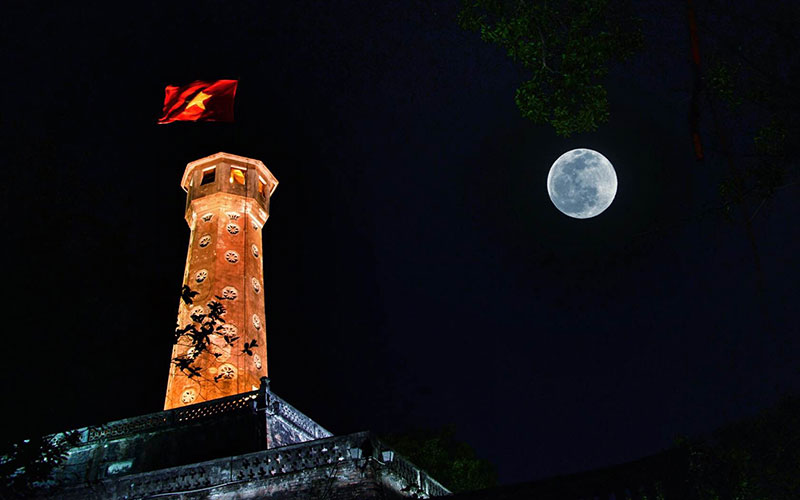The Imperial Citadel of Thang Long is a complex of historic imperial buildings located in the centre of Hanoi, Vietnam. It was first constructed in 1011 under the reign of Emperor Lý Thái Tổ of Lý dynasty.
In the beating heart of North Vietnam is the bustling metropolis of Hanoi, one of the oldest cities in the world. While neon billboards, shiny skyscrapers, and luxurious cars have all taken their place in Vietnam’s capital city, a walk down the overgrown alleys, or a few hours spent exploring the beautiful pagodas and ancient buildings tells another story. Hanoi is a city where history coexists with the modern world, where the treasures of the distant past are kept alive in culture, in art, and in many spectacular historical sites and buildings. The UNESCO World Heritage site Hoang Thanh Thang Long, or the Imperial Citadel of Thang Long, is perhaps the crown jewel of Hanoi’s legacy of historic sites.
With an origin dating back to the 7th century, the Imperial Citadel of Thang Long gives visitors the chance to explore architecture, relics, and stories stretching back through 1,300 years of Vietnamese history. 2022 saw the launch of the night tour “Decoding the Imperial Citadel of Thang Long” which offers a unique experience of this magnificent site. Now, tourists, travelers, and locals alike are able to see the citadel like never before, with a program that includes special art performances, traditional refreshments, and visits to archaeological sites and artifacts while learning about their stories.
“Decoding the Imperial Citadel of Thang Long” reveals a part of the history of Thang Long Imperial Citadel lasting from the 7th to the 19th , during the dynasties of Dai La, Ly, Tran, Mac, Le and Nguyen. A new and unique feeling will be experienced here.

No Tour Like It
Hoang Thanh Thang Long receives thousands of visitors every day, but when the sun goes down and the city lights shimmer on in the night, a truly special experience becomes available. While the history of the site goes back 1,300 years, most of the original buildings have been destroyed, which makes sharing the story of the Imperial Citadel more challenging. It was in response to this challenge that the Thang Long Heritage Conservation Center launched the night tour in April 2022. With the goal of boosting post-Covid tourism and giving new access to these fascinating stories, “Decoding the Imperial Citadel of Thang Long,” is an innovative, multisensory journey.
Throughout the tour, visitors are given 8 questions about relics and antiques they will discover during the tour, and invited to take part in a decoding game. This spices up the learning experience, allows guests an exciting way to review what they’ve learned, and rewards them with meaningful souvenirs for completing the challenge.
The Highlights
The 1.5 hour tour runs every Friday and Saturday night, starting at 19:00. Visitors meet at Doan Mon Gate – the door to the Forbidden City, once home to the King of Vietnam. Through the gate, guests are greeted with melodic harmonies and the graceful patterns of a royal dance performance, bringing the cultural traditions of the ancient citadel to brilliant life.
 100vw, 870px” data-recalc-dims=”1″></p> <p id=) Source: Hoàng Thành Thăng Long
Source: Hoàng Thành Thăng LongContinuing on, guests will get a closer look at artifacts that represent over 1,000 years of history at Hoang Thanh Thang Long, preserving the craftsmanship and artistic legacy of Vietnam in the form of ceramics, carvings, tools, and more. These relics provide countless windows into the events, cultural values, joys and tragedies of different dynasties and eras. Visitors are then invited to observe the incense offering ceremony, which commemorates the ancestors at Kinh Thien Palace, the center of the ancient citadel that was considered the center of heaven and earth.
 100vw, 870px” data-recalc-dims=”1″></p> <p id=) Gallery in the Imperial Citadel of Thang Long. Source: Hoàng Thành Thăng Long
Gallery in the Imperial Citadel of Thang Long. Source: Hoàng Thành Thăng LongNext up is a visit to the site at 18 Hoang Dieu Street, where archaeologists have unearthed millions of relics after years of excavation, creating a map of the overlapping dynasties and periods of the past from the objects they left behind. Guests have the chance to draw water from a well dating back to the Tran dynasty (13th-14th centuries) which was once used to serve the king. The well, seen as a source of life, symbolizes the inexhaustible culture of Vietnam, still giving water after a thousand years.
After seeing the sites, visitors are challenged to complete the game of “Decoding the Imperial Citadel of Thang Long”, using the hints and clues they have learned to identify artifacts projected by laser onto parts of the site and river. Finally comes a relaxing treat of traditional lotus tea and lotus jam, enjoyed under the Bodhi tree, a symbol of luck and peace.
 100vw, 870px” data-recalc-dims=”1″></p> <p id=) Lotus tea. Source: Hoàng Thành Thăng Long
Lotus tea. Source: Hoàng Thành Thăng LongAfter such a packed and immersive adventure, visitors are sure to leave the Imperial Citadel of Thang Long satisfied and quite a bit more knowledgeable about Vietnamese history than when they arrived.
@ Vietnam.Travel
